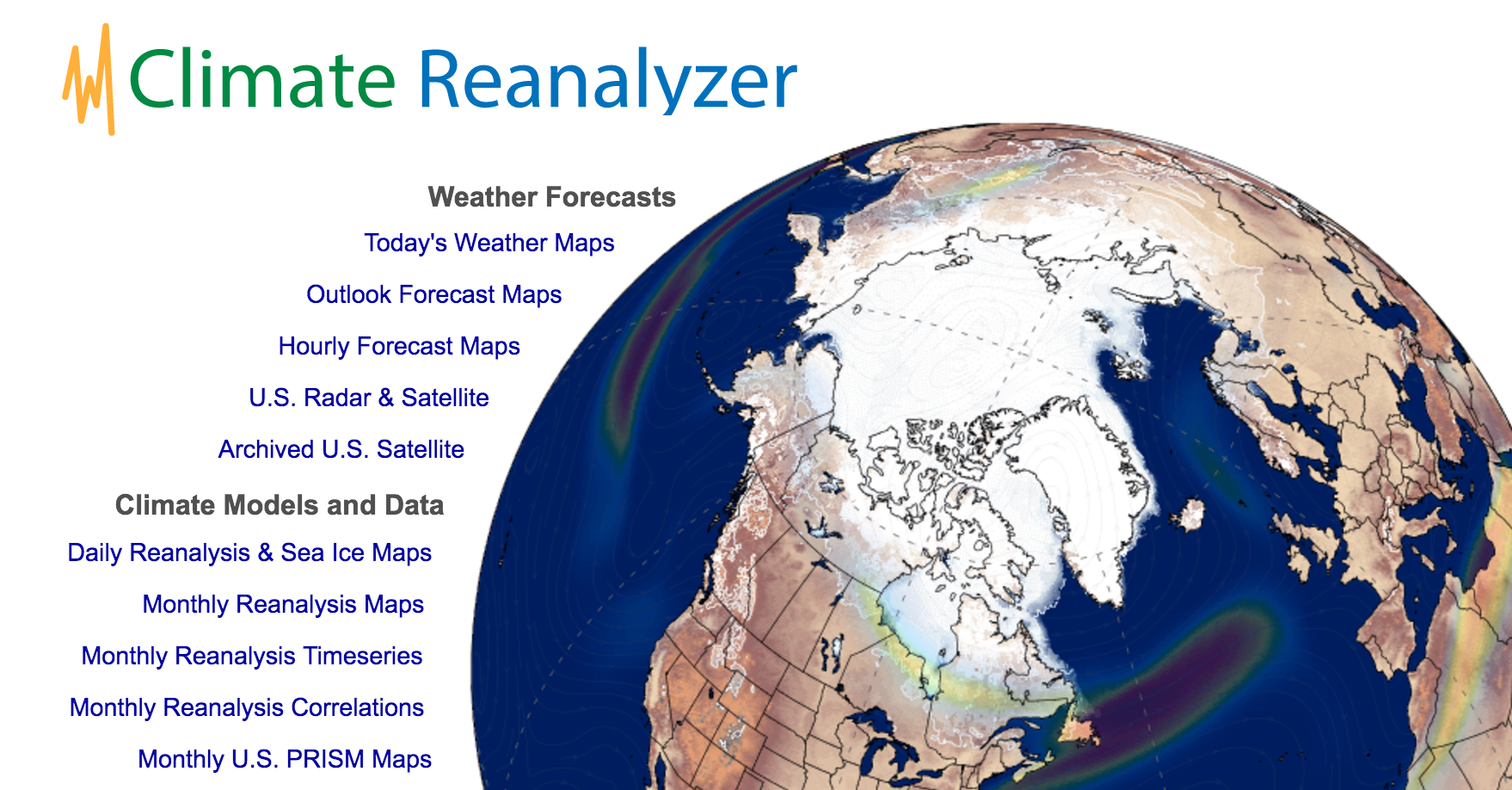
by Helen Hill for MGHPCC
A team from the University of Maine uses a Northeast Cyberteam Program seed grant to upgrade a public climate data visualisation tool developed at the U Maine Climate Change Institute.
University of Maine research faculty member Dr. Sean Birkel, who also serves as Maine State Climatologist, is a research scientist with expertise in climate and glacier modeling. Among his particular interests, which include modern, historical, and ice-age climate, as well as environmental health, is data visualization.
Since early 2012, Birkel has been the primary force behind the development of a web tool known as Climate Reanalyzer, an online portal providing public access to climate models, weather forecasts, and historical weather station data to give ready access to researchers, teachers, students, and laypeople interested in exploring events and trends in historical climate data.
Since Fall 2017, thanks to a seed grant from the Northeast Cyberteam Program, Birkel has been working with University of Maine (UM) Undergraduate Research Assistant Daniel Paradis on a cyberinfrastructure project geared towards making improvements to the functionality, efficiency, and capacity of the Climate Reanalyzer website.
Birkel started developing the web tool as a way of providing his colleagues at the UM Climate Change Institute access to a reanalysis model provided by the European Center for Medium Range Weather Forecasting called ECMWF ERA-Interim. Over time it has evolved and grown to host multiple reanalysis products, contemporary forecast, and historical data.
Reanalysis is a type of numerical weather model that is initialized with ingests of historical weather data. Reanalysis models, of which Birkel explains there are more than a dozen global and regional frameworks, estimate meteorological conditions of the atmosphere across the globe near the surface and with height. Such models are used for understanding processes associated with day-to-day weather and with long-term climate but Birkel believes there is value in everyone being able to readily access historical weather data as we face the changing climate of the future.
At first Climate Reanalyzer provided access to only monthly mean reanalysis, but with time Birkel added daily means, and is now working on adding 3-hourly data. "Once I had written a basic webpage for generating maps and time-series for ERA-Interim, I realized that I could add other models," he said.
As well as multiple other global and regional weather forecast maps and time series, Birkel added access to the Global Historical Climatology network, GHCN, an integrated database of climate summaries from land surface stations across the globe that have been subjected to a common suite of quality assurance reviews provided by NOAA.
"Climate Reanalyzer currently offers GHCN data through an existing PHP web interface using a method of converting the raw ASCII datafiles to netCDF using NCAR Command Language (NCL)," Birkel explains, "but the method is clunky and files have not been updated since 2012. Daniel is helping to solve this problem using Perl scripting to parse raw GHCN datafiles and to output clean CSV-formatted files that can be read directly in a Javascript-based web interface."
Paradis has also been working to improve a subset of Climate Reanalyzer that provides access to daily meteorological station data from the GHCN. "Raw GHCN ASCII datafiles are organized by station, and each station datafile contains multiple variables along with data quality flags. The way in which raw GHCN files are constructed does not lend to easy import into spreadsheet environments. Thus, analysis of GHCN data is largely limited to those who can parse the raw datafiles by writing scripts. NOAA provides a useful map interface for selecting GHCN stations and obtaining raw data, but the plotting capabilities of the interface are limited." explains Birkel.
Paradis also assisted by setting up a virtual Linux machine and web server using resources from the University of Maine Advanced Computing Group (UM ACG), which will ultimately enable Climate Reanalyzer to be migrated from desktop servers to the centralized UM ACG equipment.
Birkel hopes that when finished, Climate Reanalyzer will provide the easiest, most efficient access to anyone interested in examining GHCN records.
Birkel says, "Over time Climate Reanalyzer's reach has grown significantly up from just ~30 daily visitors in the summer of 2013, to closer to ~2,000 daily visitors today." He is especially gratified for those several occasions when graphics from the site have been used in news articles and on social media, when usage has spiked to as high as ~5,000 daily visitors. Since 2013 there have been about 0.5 million unique visitors based on IP address.
If you are a researcher at a similar sized institution with a comparably computationally intensive project looking for a helping hand contact Julie Ma for more details about the Northeast Cyber Team Project.
Sean Birkel is a research scientist with expertise in climate and ice sheet modeling. He was aided in this project by Undergraduate Research Assistant Daniel Paradis.
Sean Birkel
Climate Reanalyzer
Northeast Cyberteam Program
U Maine’s Advanced Computing Group